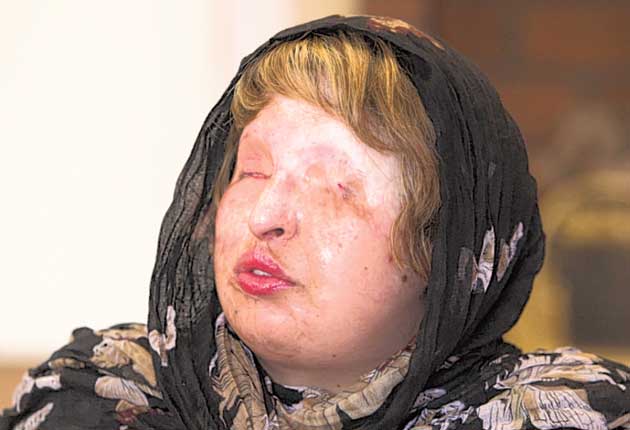Iranian victim spares her acid attacker an eye for an eye

Your support helps us to tell the story
From reproductive rights to climate change to Big Tech, The Independent is on the ground when the story is developing. Whether it's investigating the financials of Elon Musk's pro-Trump PAC or producing our latest documentary, 'The A Word', which shines a light on the American women fighting for reproductive rights, we know how important it is to parse out the facts from the messaging.
At such a critical moment in US history, we need reporters on the ground. Your donation allows us to keep sending journalists to speak to both sides of the story.
The Independent is trusted by Americans across the entire political spectrum. And unlike many other quality news outlets, we choose not to lock Americans out of our reporting and analysis with paywalls. We believe quality journalism should be available to everyone, paid for by those who can afford it.
Your support makes all the difference.An Iranian woman blinded by a spurned suitor spared her attacker the same fate moments before she was due to drip acid into both his eyes in a Tehran hospital.
Ameneh Bahrami, who was an attractive 24-year-old engineering student at the time of the attack, was left blind and horribly disfigured after Majid Movahedi threw acid in her face in 2004 after she repeatedly turned down his proposals of marriage.
But as she prepared, literally, to take "an eye for an eye", she exercised her right to pardon her attacker under Sharia law.
In footage aired yesterday on Iranian state television, Movahedi, pictured kneeling in an operating theatre as he awaited punishment, immediately burst into tears and thanked her for her generosity.
The 2008 decision by a Tehran court to uphold Ms Bahrami's demand for retributive justice drew horrified international reaction, with Amnesty International denouncing it as a "cruel and inhuman punishment amounting to torture".
It was that outcry that appeared to influence Ms Bahrami's decision not to go ahead with the procedure. "I have been trying for seven years to get the qisas [retribution] sentence, but today I decided to pardon him," Ms Ameneh was quoted as saying by Iran's ISNA news agency. "It seemed like the entire world was waiting to see what we did."
Under Sharia law, Ms Ameneh could seek retributive justice or have the sentence commuted in return for financial compensation.
The Iranian authorities initially urged her to accept blood money, but she remained determined to pursue an analogous punishment, telling the court: "Inflict the same life on him that he inflicted on me."
Even after the court ruled that the punishment should take place, the authorities initially appeared reluctant to enforce it, in part because they could find no doctor willing to carry it out. The sentence was due to go ahead in May this year, but was cancelled at the last minute, with no official reason given.
Some suggested the last-minute cancellation was a result of international pressure at a time when the authorities also faced a domestic backlash to the punishment.
The case has aroused strong passions in Iran. Some felt if Ms Bahrami took the humane option of pardoning her attacker it would encourage others to commit the same crime, while others rejected the arcane approach to justice in an increasingly progressive society.
Ms Ameneh was a student working at a laboratory in Tehran when Movahedi's parents asked for her hand in marriage for their son; she initially couldn't recall ever meeting him. When she refused, Movahedi tracked her down in person, becoming increasingly threatening towards her. She told the BBC in an interview earlier this year that he told her: "I am going to destroy your life and do something so nobody will marry you."
One day he followed her home from work. When she stepped aside to let him pass, he hurled a jar of sulphuric acid in her face. She had lost the sight in one of her eyes even before she reached hospital, but went to Spain for surgery to save the sight in the other one and reconstruct her face. An infection in 2007 robbed Ms Ameneh of her remaining sight, reportedly stiffening her resolve to punish her attacker.
Tehran's prosecutor general Abbas Jafari Dolatabadi yesterday praised Ms Ameneh's "courageous" decision to spare her attacker.
She is now seeking €150,000 (£130,000) in financial compensation to pay for her medical treatment, even though her lawyers have previously indicated it would be difficult for her to collect the sum because the Movahedis' only asset is a house in Tehran.
Movahedi, who has remained in jail since 2004, will not be released until the money is paid.
Although welcoming Ms Ameneh's decision, Amnesty International said Iran must review its penal code "as a matter of urgency to ensure those who cause intentional serious physical harm ... receive an appropriate punishment."
Subscribe to Independent Premium to bookmark this article
Want to bookmark your favourite articles and stories to read or reference later? Start your Independent Premium subscription today.
Join our commenting forum
Join thought-provoking conversations, follow other Independent readers and see their replies
Comments